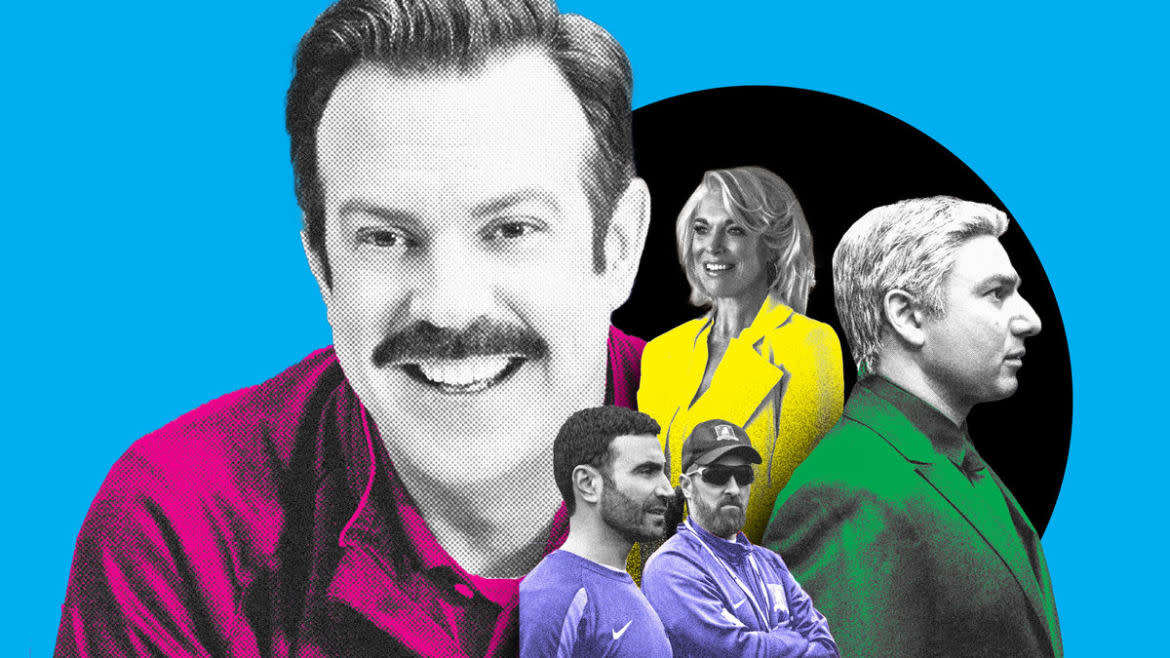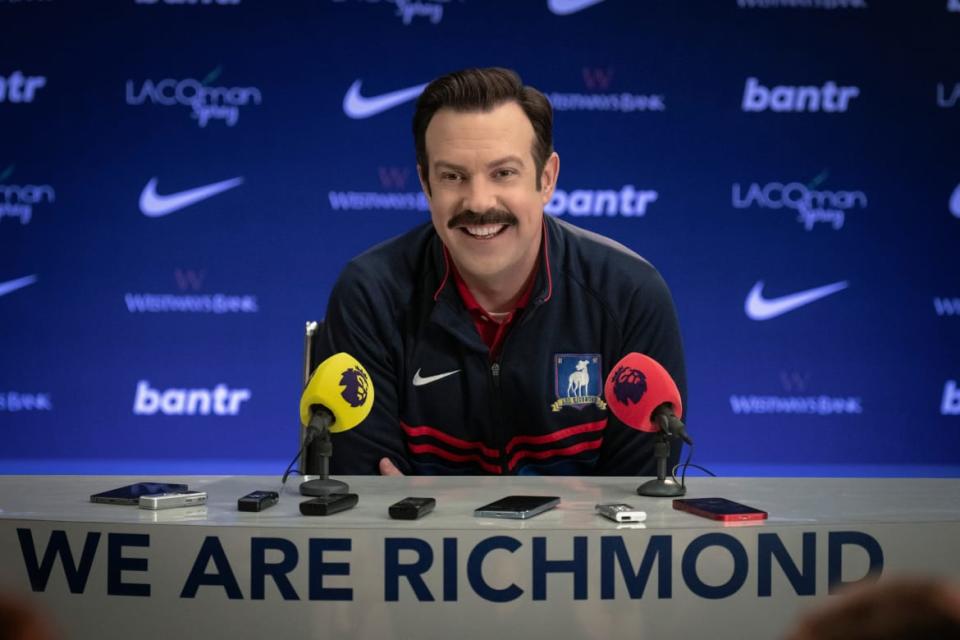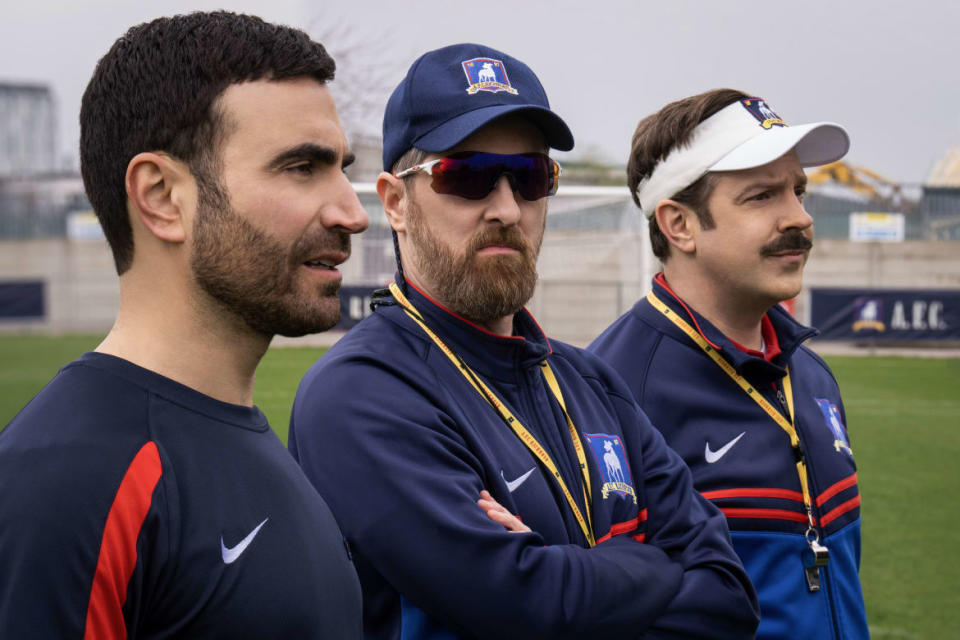The New ‘Ted Lasso’ Season Gives Fans Exactly What They Want—For Better and Worse

This is a preview of our pop culture newsletter The Daily Beast’s Obsessed, written by editor Kevin Fallon. To receive the full newsletter in your inbox each week, sign up for it here.
It’s been one of those weeks where I felt like I really needed a hug. Being that I’m a person who fastidiously avoids other humans at any and all costs, that was not in the cards for me. But I did get the next best thing: I got to watch some new episodes of Ted Lasso.
Season 3 of the Emmy-winning Apple TV+ sensation begins Mar. 15, and, if the episodes we’ve screened are an indication, that’s exactly what the show now is: a pop-culture equivalent of a hug. That’s both high praise and, I suppose, fair criticism. Whichever side of the spectrum you might fall on when it comes to your relationship to Ted Lasso, it’s also what makes the new season quite refreshing.
A third season of a show this confident in its signature tone, cadence, and characters doesn’t have the burden of winning over new fans, defending itself against its detractors, or solidifying its reputation by avoiding a sophomore slump. It is what it is, and it does what it does.

If you’re a person for whom Ted Lasso and its intrinsic loveliness hits a sweet spot you crave, as if the show itself is the anomaly and antidote to the jadedness and cynicism in the world that the character Ted Lasso is in the world of the series, then the return will be gratifying. It’s a comfort for those seeking that out. It’s a hug. You know if you’re a hugger or not, and you know, at this point, if you’re a Ted Lasso person or not.
That’s not to say the show is all sunshine and rainbows. Season 2 of Ted Lasso incited much debate among fans for taking a turn towards darkness. It dove into Ted’s past trauma, his mental health issues, and his need for therapy.
While some wished the series just let the man make his little biscuits and toss off his folksy, Pollyanna sayings, others appreciated the richer exploration of what was beneath Ted’s optimistic demeanor. And while the Cinderella story of the first season nailed every right note of the predictable narrative, Season 2’s exploration of what happens at the end of the fairy tale—maybe things aren’t always so great for Princess Cindy once she’s in that castle!—brought the sweetness of Ted Lasso down to earth in a rather daring way.
‘You’ Just Pulled a ‘Gossip Girl’ Twist in the Funniest Way Possible
Season 3 opens with Jason Sudeikis as Ted, staring off into the distance, depressed and forlorn. His son has spent six weeks living with him in England, and now it’s time for him to go back to the U.S. On the way home from the airport, Ted rings his therapist (Sarah Niles) to talk through his sadness and guilt. “I know why I came,” he says, about his decision to fly across the ocean and away from his child for a job. “It’s the sticking around I can’t quite figure out.” His friends notice. “No arriving salutation?” Rebecca (Hannah Waddingham) asks when Ted glumly arrives at her office. “Is something wrong?”
Don’t be alarmed; there’s no incessant wallowing to be fearful of. Sudeikis still gets to deliver a ticker tape of Lasso-isms. The genuine affection that’s grown between Ted, Rebecca, and the rest of the Richmond employees is irresistible and endearing. I can’t think of a show—even more traditional laugh-track sitcoms—on which people smile at each other as much as they do on this one. I almost feel ridiculous marveling at it, but it did really strike me. It’s not just infectious; it’s meaningful. And proof, again, of, even as it has evolved, how well Ted Lasso knows itself and what is intrinsic in its DNA.
When it premiered during the start of the pandemic, there was something restorative about Ted Lasso that led to its word-of-mouth surge in popularity. The series offered near-incessant revelations about who we are as people and the potential for goodness in our lives. On the surface level, those revelations are portrayed as a joke—Ted Lasso, what a goofball—a creative sleight of hand that only makes more profound the series’ ruminations on humanity and its indictment of our instinct towards cynicism and nihilism.

Ted Lasso reminded us of our own happiness agency, at a time when we had become certain that such serotonin would never be experienced again. It would never be instant, and the work might be brutal and uncomfortable. But it might also be the most rewarding kind of work there is. The world of Ted Lasso wasn’t entirely a fictional, fantasy one in which everything was nicer than in our reality. It begged us, as Ted himself does his team, to realize that our world can be nice too—rather, is nice—if we only did the work that would allow ourselves to see it.
The great thing about Season 3 is that it doesn’t confuse that niceness for delusion. Yes, Richmond won the key game that promoted them to the Premier League, but they are also being mocked by the media and predicted to finish dead last. Their former coach, Nate (Nick Mohammed), left them for a rival team and is diabolical about his mission to take them down. (Fans of Season 1 who were more lukewarm about Season 2 rejoice: Richmond is the underdogs again.)
The characters who had made great strides in their personal lives are all in “now what?” phases. It echoes not just Ted’s wondering of whether it’s right for him to still be in England, but something many of us are feeling, as we start to feel more emerged from the trauma of the last few years and unsure how to handle what that means in our lives.

Rebecca, while coming into her own as the woman in charge of the team, still can’t shake the bitterness of her divorce and desire to best her ex-husband both in life and at work. Roy (Brett Goldstein) broke up with Keeley (Juno Temple), but has mixed feelings over whether it was the right move. Keeley’s career is blossoming, as she now runs her own PR firm, but the workload is such that she must schedule time at her desk to cry. “Crying is the best, isn’t it? It’s like an orgasm for the soul,” Rebecca tells her, one of my favorite lines.
But, again, what the early episodes of the season—we’ve seen four—mostly deliver is its version of that hug. It really is giving fans what they want, even if that means that the story arcs are frustratingly repetitive. Maximilian Osinski, in a new role that we won’t spoil, does a lot of work—some might say too much—to spice that up. And sometimes I’m jarred, in a great way, into remembering that this is a streaming series that, despite the whole “Ted Lasso niceness” thing, is not G-rated, whether it’s a well-placed “fuck” or the sight of a bare bum.
Meet Chris Perfetti, the Lovably Corny Breakout Star of ‘Abbott Elementary’
By the time Ted Lasso gives us Goldstein as Roy Kent shouting enthusiastically, “Fuck yeah, Princess Diaries!” you’ll either be ready to cheer along with him or boo, mortified at the fan service. Me? I clapped. Things are bleak enough as it is. Let me—and my fellow Ted Lasso Heads—have this.
Keep obsessing! Sign up for the Daily Beast’s Obsessed newsletter and follow us on Facebook, Twitter, Instagram and TikTok.
Get the Daily Beast's biggest scoops and scandals delivered right to your inbox. Sign up now.
Stay informed and gain unlimited access to the Daily Beast's unmatched reporting. Subscribe now.

 Yahoo News
Yahoo News 
